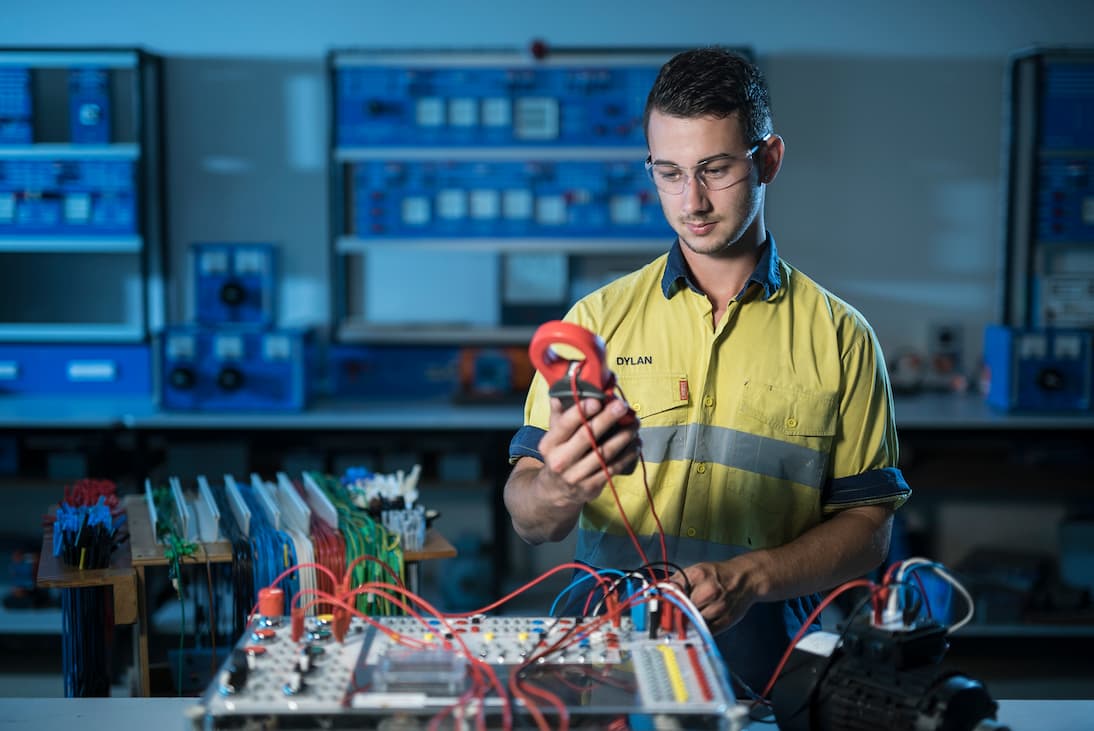Compulsory professional development is already a requirement for many professions, and similar regimes may soon be introduced for fridgies. Louise Belfield speaks to workers and business owners to see what they think.
Doctors, lawyers, teachers, engineers … these workers must undertake training and other structure learning on a regular basis to be able to practise. This is known as mandatory continuing professional development (CPD).
In some jurisdictions, the rule already applies to trades such as electrical, but so far, it has not greatly affected HVAC&R technicians. Now, that is set to change.
Victoria’s Department of Transport and Planning is aiming to introduce mandatory CPD for fridgies in 2025. it is developing a framework that will require HVAC&R technicians – as well as other building practitioners and plumbers – to meet CPD requirements.
In Victoria, HVAC&R work is regulated under plumbing regulations, so the changes will cover refrigerated air conditioning and mechanical services licence-holders. The framework aims to improve confidence in the community that all practitioners are competent in their work by ensuring they maintain and develop their professional knowledge and skills. The plan is for this to roll out in Victoria in 2025 and involve six hours of CPD training per year.
So, why is mandatory CPD important, what kinds of courses could qualify, and what kind of training would fridgies prefer to focus on? And will mandatory CPD facilitate the shift towards natural refrigerants, or is it just another layer of red tape?
Working safely with natural refrigerants
Natural refrigerants are non-synthetic substances with a far lower global warming potential (GWP) than many synthetic refrigerants. They include hydrocarbons such as isobutane, propane, ammonia, and CO₂, which can be more complicated to manage because of their flammability, toxicity, or significantly higher working pressures.
Melbourne-based business owner and fridgie Michael Weinstock runs AERO Airconditioning and Refrigeration. His view is emphatic: all fridgies must have the proper training to handle these natural refrigerants.
Weinstock has undertaken training on natural refrigerants and is quite comfortable working on hydrocarbon refrigerant systems.
“I had additional training when I was going through TAFE and finished in 2019,” Weinstock says. “I actively work with hydrocarbon refrigeration.”
From where he’s standing, there are not nearly enough fridgies out there who are trained to work on these systems.
“I’ve seen this firsthand. When I was a first-year apprentice my boss dabbled with hydrocarbons, and having been trained on them now I can see he had no idea what he was doing, and he was not working safely.
“There’s a real safety gap, and there is a real need for additional training in the industry for hydrocarbons. It’s a huge safety issue, because the standard practices that we have been using to install A1 refrigerant (non-flammable) are very different to working with A3 refrigerant (flammable). And it concerns me, because people can really hurt themselves and others.”

Little surprise, then, that Weinstock is a passionate advocate for mandatory CPD. “It’s got to be mandatory: mandatory hands-on work with hydrocarbon refrigerant for anyone working on hydrocarbon refrigeration systems. It’s just not optional.
“While you can get away with doing stuff badly with A1 refrigerant, you might not be a good fridgie, but no one’s likely to get hurt. And your customers might not like your work, but with hydrocarbons, you get it wrong and things can go south very, very, very quickly.”
Weinstock does not regard the DTP’s proposal as simply adding another layer of red tape to already over-burdened businesses.
“I don’t think that at all. As I said, I’m lucky enough to have done the hands-on training and already work with natural refrigerants in the hydrocarbon space. So, I’ve been through the safety training and I actively use it. And I’m fairly active on fridgie forums, Facebook and what have you, and I see what’s going on.
“And you know when a fridgie who has not been trained on hydrocarbon comes across the hydrocarbon system and believes that they can work on it just like they would any other system. It’s a huge red flag.
“The questions they ask [on the forums] show that there’s an inherent lack of understanding of the extra layer of safety that is required for working safely on these systems.”
Weinstock cites an incident a few years ago where an worker was replacing a compressor on a refrigeration system using hydrocarbon refrigerant.
“It all went south and it exploded, and he got very serious burns. There’s video of him running through the plaza trying to take a burning compressor out of the building. We’re not just talking burns, either; we’re talking about an explosion in one of the tenancies.
“And here’s the thing: people with a Cert 2 – so, not full fridgies – can easily access these type of hydrocarbon refrigerants because they are not a controlled substance. You can go into almost any auto parts stores and buy these hydrocarbon refrigerants because they’re not licensed by the ARC. They have no ozone depletion potential and almost no global warming potential, and because they’re not a controlled refrigerant, anyone can access it.
“It’s a bit of a time bomb, because there are always going to be people out there who are willing to have a go whether they’re trained or not. If there’s not enough knowledge out there that you can’t safely work on these systems unless you have that training, people are going to get hurt.”
Red tape and cost
Mick and Tammy Stagg of Mick’s Air-Conditioning Services in Gracemere near Rockhampton, Queensland have been in business for 25 years. They share a similar view to Weinstock, although Tammy says that as a primary school teacher in an earlier life – and now studying accounting – she is well aware of CPD and its implications across sectors.

Mick believes mandatory CPD “will be good; it’s what the industry needs, but it shouldn’t need to come to that”.
Tammy adds that compulsory CPD will create red tape and extra cost, forcing people into situations where it doesn’t always work. “This was one of the reasons I left the teaching profession – it was too hard to tick all of the boxes of the CPD.”
“[For anyone] truly serious about working in this industry, then most will take part in opportunities to be up to date with current technologies and legislation. For us, it’s a major part of our business to take part in manufacturer training opportunities, trade nights, and reading industry publications so that we are up to date and provide the best service possible to our clients.”
CPD opportunities are unlikely to be consistent from year to year, Tammy points out. “This makes it difficult to put a timeframe on CPD. So maybe instead of restricting to a 12-month quota, expand it to a two- or three-year requirement and include a vast array of opportunities.”
From her perspective, mandatory CPD would need to offer flexible regulations and recognise the inherent differences between industries and individual positions.
“The CPD could include TAFE short courses – tailored specifically to the purpose of industry CPD – manufacturer training sessions, QBCC [Queensland Building and Construction Commission], ARC, and ESO [emergency services officer] training days to bring everyone up to speed with latest legislative requirements; documentation of reading journals, newsletters and articles; team building meetings; and trade nights or days.
“The industry is very broad and not all tradies would require the same types of training. For instance, those in the commercial refrigeration sector would be working with different information and technology to those in the domestic air conditioning sector.”
It would also need to be accessible to everyone, she says. “Not everyone in rural and remote areas can access training in Brisbane or other metropolitan areas. Being in a regional centre this is something that we’ve found over the years. With short notice and long distances, quite often we just have to say, ‘no, sorry, we can’t make it’.”
Providing choice
Grant Mallett, Affil.AIRAH, teaches electrotechnology at TAFE Queensland’s Ashmore Campus. He believes introducing mandatory CPD will only make the industry stronger.
While he anticipates some backlash within the greater refrigeration community – from those who believe they don’t need the training because they “know their job”, those who are afraid of change, and those who cite the implications for cost and work/life balance – “these are just excuses for those of us who don’t like change”.
However, “system performance and energy efficiency should be targeted,” he says. “Our industry seems to have lost sight of this and is more concerned with ‘time is money’.
“Sustainable energy and a greater understanding of new refrigerants and what is available should also be considered,” Mallett says. “We see R448a and R449a being pushed in both medium- and low-temperature applications, where a little-heard-of refrigerant R513a is a much better option for medium temperatures as it has zero glide and produces lower discharge temperatures than the aforementioned refrigerants.
“Hydrocarbon, CO₂ and ammonia courses would be advantageous with the push into natural refrigerants, and a Cert IV in refrigeration would also be great for CPD,” he says.
“Each course should have a different amount of points allocated to it depending on the length of the course and its in-depth technical nature. Perhaps courses that lean towards efficiencies and sustainability could carry more points.”
Ultimately though, Mallett says if the choice of types of training is up to the individual (within a given scope), then “more of the industry would be on board as they would have more control of what training can do”.
Sydney-based fridgie and 10-year veteran in the industry Bridie Kate Murko couldn’t agree more. Murko works for Daikin as a service technician. Her work has been in container refrigeration, cool rooms and freezer rooms, and commercial and supermarket refrigeration both in the Sydney area and regionally in Tamworth.

She believes the training that would be most beneficial for her would be anything that helps her to expand knowledge hands-on, find better and quicker ways to diagnose, and also to deepen her knowledge of certain fields, somewhat in line with a Diploma of Engineering.
Ultimately, she says, we need “more training on safer ways to handle natural systems mechanically, electrically, and physically”.
“The world is already shifting towards natural refrigerants, so I believe [any CPD training in this area] will accelerate the shift. We need to have facilities and enough knowledge for others to learn and develop their own knowledge in natural refrigerants.”
The official view
According to the Victorian Department of Transport and Planning (DPT), “When competency is not developed or maintained after a practitioner first becomes registered or licensed, knowledge and skills can deteriorate over time or can become outdated due to changes in technology, methods, materials or work standards and regulatory requirements.
“This can lead to a number of harms, including damage to property and financial loss, reputational loss for practitioners, and negative health and safety outcomes for practitioners, building occupants and other members of the public.”
The DTP has prepared a regulatory impact statement (RIS) and proposed regulations to seek views on the implementation of a mandatory CPD framework in Victoria.
The RIS presents the costs and benefits of options to introduce mandatory CPD, which has incorporated feedback received on a 2020 consultation paper and stakeholder consultation workshops conducted throughout 2021.
The RIS outlines three broad options for introducing a CPD framework in Victoria: a government-directed approach; a practitioner-led approach; and a combination approach mixing mandatory and self-directed learning with options to follow an individual learning pathway or sign up to an approved industry program.
You can find the RIS on the Engage Victoria website under Key Documents.
 Louise Belfield
Louise Belfield


Leave a Reply to Michael Cancel reply